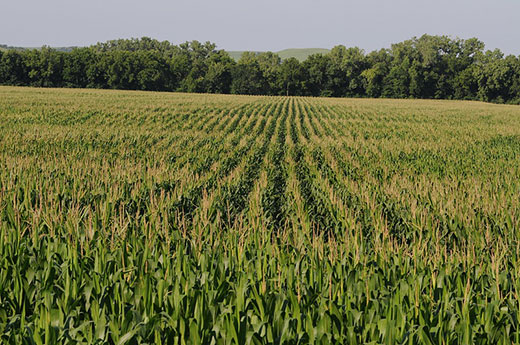
K-State Research and Extension and industry sponsors present the 2020 Cover Your Acres Winter Conference Jan. 14-15 in Oberlin, Kansas. | Download this photo.
2020 Cover Your Acres Conference highlights plants, people
Agronomic and Economic issues to be addressed at 17th annual conference
January 6, 2019
COLBY, Kan. –Producers, consultants, and experts will gather for the 17th annual Cover Your Acres Winter Conference on January 14-15, at the Gateway Civic Center in Oberlin, Kansas. The conference is a joint venture between K-State Research and Extension and conference sponsors.
“Economics is big on everyone's mind right now,” says Lucas Haag, an agronomist with K-State Research and Extension’s Northwest Area Office in Colby. “So, we have Jordan Steele, the lead economist with Northwest Kansas Farm Management Association, presenting their analysis of members’ data and trying to look at what is driving profitability in our operations here in northwest Kansas and what potential pitfalls producers should be aware of.”
In addition, Aaron Harries with Kansas Wheat will discuss the current issues and future opportunities in the wheat market.
Weed control continues to be a leading challenge for many producers in the Central High Plains. Malynda O’Day and Luke Chism, graduate students in K-State’s Department of Agronomy, will present on how cover crops can be used as a weed management tool. Additionally, Jeanne Falk Jones, multi-county extension agronomist, will discuss opportunities to wage a successful war on difficult weeds such as Palmer amaranth and Kochia.
Other topics include planter technology advancements, insect management in dryland corn, alternative crops, interpreting nutrient ratios and soil health tests, drivers of profitability in irrigated corn, and a discussion of why a food company such as General Mills would be interested in soil health.
The same programs will be offered both days of the conference; participants attending both days will find it easier to catch most, or all of the programs. The program offers a total of 10 continuing education unit credits for Certified Crop Advisors and two CEU’s for Commercial Applicators.
Registration will begin at 7:45 a.m., with educational sessions ending at 5 p.m. followed by a social on Tuesday evening, where attendees can visit with industry and university specialists while enjoying heavy hors d’oeuvres.
Early registration is due by Jan. 8. The fee is $50 for Tuesday, $45 for Wednesday, or $65 for both days. After Jan. 8, the cost is $65 per day. The conference fee includes lunch, morning and afternoon refreshments, and educational materials.
The full conference schedule and online registration are available at www.northwest.ksu.edu/coveryouracres. For questions, call 785-462-6281.
Major sponsors of the conference include Pioneer, Sims Fertilizer and Chemical, Hoxie Implement Co., Lang Diesel, Bayer, National Sunflower Association, Plains Equipment Group, Nutrien Ag Solutions, and SureFire Ag.

